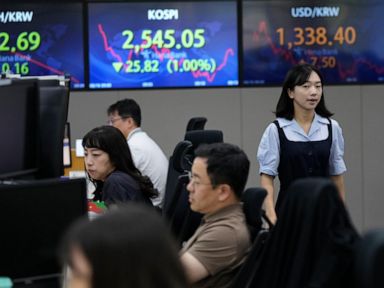TOKYO — Asian shares declined Wednesday amid worries over discouraging data on China, as well as over the future of the U.S. economy.
Japan’s benchmark Nikkei 225 dropped 1.1% in morning trading to 31,879.84. Australia’s S&P/ASX 200 dove 1.4% to 7,204.00. South Korea’s Kospi dipped 1.2% to 2,539.48. Hong Kong’s Hang Seng slipped 1.2% to 18,364.11, and the Shanghai Composite lost 0.7% to 3,153.43.
New Zealand’s central bank left its benchmark interest rate unchanged at 5.5% on Wednesday. The Reserve Bank of New Zealand’s monetary policy committee said the headline inflation rate had declined, but core inflation remained too high. The committee said it would take a prolonged period of subdued spending to reduce inflation pressure. The New Zealand dollar was little changed on the news, trading at around U.S. $0.6.
“A recent set of disappointing economic data out of China has not been encouraging for the region,” said Yeap Jun Rong, market analyst at IG.
Clifford Bennett, chief economist at ACY Securities, believes that strong U.S. consumer spending could be momentary and run out of steam.
“This is perhaps largely due to the huge sale efforts that took place both online from Amazon and at major stores in general. It could be the case that all of that retail sales gain completely disappears in August. Remember, we did say this would be a strong result, but possibly the last of the good retail sales numbers for quite some time,” he said.
On Wall Street, the S&P 500 slumped 1.2% for one of its worst drops since the spring after data showed a deepening slump for the world’s second-largest economy. The Dow Jones Industrial Average tumbled 361 points, or 1%, and the Nasdaq composite sank 1.1%.
Coming into this year, the expectation was that China’s economy would grow enough after the government removed anti-COVID restrictions to prop up a global economy weakened by high inflation. But China’s recovery has faltered so much that it unexpectedly cut a key interest rate on Tuesday and skipped a report on how many of its younger workers are unemployed.
Worries about the knock-on effects for the rest of the global economy are weighing on Wall Street, where stocks have already been retrenching in August. The pullback follows a gangbusters first seven months of the year that critics called overdone.
In the U.S., the economy has remained more resilient than expected despite higher interest rates. A report on Tuesday showed growth for sales at U.S. retailers accelerated by more in July than economists expected.
“U.S. retail sales are charging ahead, and a lot of that may be on charge cards,” said Brian Jacobsen, chief economist at Annex Wealth Management. “Still, the U.S. consumer is showing few signs of slowing down.”
The strong retail sales report raises hopes that the U.S. economy can keep growing and avoid a long-predicted recession. But on the downside for markets, it could also raise the Federal Reserve’s resolve to keep interest rates high in order to fully grind down inflation.
The Fed has already hiked its key interest rate to the highest level in more than two decades. High rates work by bluntly dragging on the entire economy and hurting prices for investments.
“Numbers like today’s just make it more likely that rates will remain higher for longer, even if the Fed doesn’t hike them next month,” said Mike Loewengart, head of model portfolio construction at Morgan Stanley Global Investment Office.
Treasury yields initially rose following the retail sales report, approaching their highest levels since the 2007-09 Great Recession, before jostling up and down.
A faltering Chinese economy could mean less demand for oil and other commodities. In energy trading, benchmark U.S. crude lost 7 cents to $80.92 a barrel. The price for a barrel of U.S. crude oil dropped $1.52 to $80.99 Tuesday. Brent crude, the international standard, fell 7 cents to $84.82 a barrel.
The declines meant stocks of energy producers were among the biggest losers in the S&P 500. Exxon Mobil’s 2.6% drop was one of the heavier weights on the index.
Banks also sank, continuing a rocky run since the high-profile failures of several during the spring that were caused in part by high interest rates.
All told, the S&P 500 fell 51.86 points to 4,437.86. The Dow dropped 361.24 to 34,946.39, and the Nasdaq sank 157.28 to 13,631.05.
In the bond market, the yield on the 10-year Treasury rose to 4.21% from 4.20% late Monday. It helps set rates for mortgages and other important loans.
The two-year Treasury yield, which more closely follows expectations for the Fed, fell to 4.94% from 4.97%.
In currency trading, the U.S. dollar edged down to 145.49 Japanese yen from 145.57 yen. The euro cost $1.0908, inching up from $1.0904.
___
Associated Press Writer Nick Perry and AP Business Writer Stan Choe contributed to this report.



